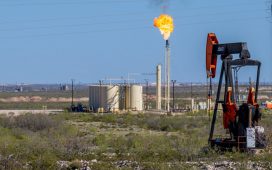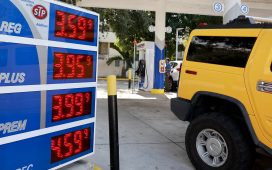
Visitors to the annual Offshore Technology Conference in Houston walk through the exhibits … [+]
ASSOCIATED PRESS
As if gasoline prices weren’t already high enough, a cyber attack on the Colonial Pipeline system could cause them to move even higher along the Atlantic Coast and into the Northeast.
In a media statement issued late Friday, the Colonial Pipeline Company announced that it had “…learned it [is] the victim of a cybersecurity attack. In response, we proactively took certain systems offline to contain the threat, which has temporarily halted all pipeline operations, and affected some of our IT systems. Upon learning of the issue, a leading, third-party cybersecurity firm was engaged, and they have already launched an investigation into the nature and scope of this incident, which is ongoing. We have contacted law enforcement and other federal agencies.”
As of early Saturday morning, the company said it is “… taking steps to understand and resolve this issue” but does not know how long its system will be shut in. The Colonial gasoline pipeline runs from Houston through the southern and Atlantic Coast states and makes deliveries all the way up to New York Harbor, delivering as much as 45% of the gasoline supply along its route.
The last major disruption of the line took place following 2017’s Hurricane Harvey, the severe flooding from which caused the shutdown of the Houston-area refineries that provide most of Colonial’s daily supply. Gasoline prices along the Atlantic Coast and the U.S. northeast spiked as shortages materialized as a result of the shutting-in of the line.
Since Election Day 2020, the average nationwide price for a gallon of gasoline has shot up by 78 cents. If the Colonial system remains shut-in for any extended period of time, prices could rise even further just as the country begins to move into the annual summer driving season, when gas prices tend to rise due to increased demand.
In another sign of our COVID-impacted times, two major oil and gas industry annual conferences held in Houston each year have decided to join forces. Organizers of the Offshore Technology Conference (OTC) and the NAPE Summit announced recently that they will hold their conferences back-to-back in August, and that attendees will be able to purchase registration passes that will provide full access to both events.
Prior to 2020, when both conferences had to be cancelled due to the COVID pandemic, these two events, along with CERA Week, attracted thousands of visitors to Houston every year, generating millions in economic impact. CERA Week, organized by IHS Markit
INFO
“As the energy capital of the world, Houston continues to be a central hub convening the best and brightest minds to solve some of the most complex energy issues facing our generation,” said Sylvester Turner, Mayor of Houston. “Houston is proud to safely and responsibly host OTC and NAPE and demonstrate our city’s continued leadership in energy and the energy transition. From oil and gas to wind, solar and hydrogen, Houston is world-renowned for its talented workforce and technological innovations in the energy industry.”
If organizers are able to pull it off, the holding of this major combined event would represent a welcome return to some semblance of normalcy as America and the industry try to move past the COVID-caused disruption.








